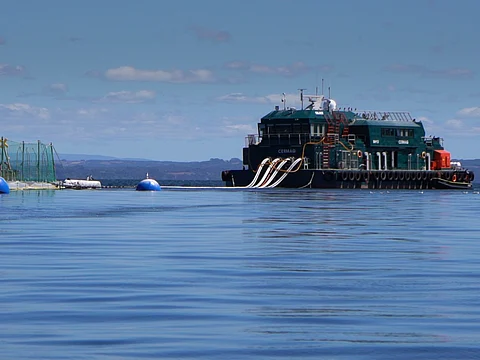

Following the court's decision, the company will have to pay a fine of CLP 9,994,200 (EUR 9,592.9 / USD 10,203.9).
Photo: Cermaq Chile.
Chile's National Fisheries and Aquaculture Service (Sernapesca) reported that the Court of Letters and Guarantee of Puerto Aysén - in the Aysén region - issued a sentence, now final and enforceable, against Cermaq Chile for failing to report a veterinary treatment within the legal deadline.
Specifically, the company failed to comply with the provisions of Article 57 of the Sanitary Regulations (RESA) - also part of Article 86 of Chile's General Law on Fisheries and Aquaculture - according to which salmon farming companies are obliged to report all veterinary treatments to the supervisory institution, in this case, Sernapesca.
"This ruling is relevant because it shows that the judges know how important it is for companies to comply with current regulations," said the Regional Director of Sernapesca Aysén, Daniela Leiva, commenting on the court's decision.
"For our part, we will continue to monitor the aquaculture activity in person, with overflights in the area, and also remotely and with documents. We expect an improvement in the conduct and compliance of salmon farming companies, avoiding recidivism in these matters," she added.
Following the judgment, Cermaq Chile must pay a fine as a repeat offender of 150 UTM (Monthly Tax Unit, a tax measure used to pay certain credits which amount is determined by law and updated monthly). In November 2024, this is equivalent to CLP 9,994,200 (EUR 9,592.9 / USD 10,203.9), which the company must pay within ten days from November 6, when the ruling became final and enforceable.
Less than a month ago, Cermaq Chile had to face another fine - CLP 3,328,050 (EUR 3,244 / USD 3,516) in this case - for violating the control of the ISA virus in one of its farms. A court rejected the company's appeal and upheld the sanction even though it was proven there was an error on the part of the Health Condition Certifier and the laboratory.
Following this new sentence, the Chilean National Fisheries and Aquaculture Service emphasized that the Court's decision reinforces the importance of the provision of information by salmon farming companies, particularly in a matter of such relevance as the reporting of pharmacological treatments.
Sernapesca emphasized this is the basis for determining regulatory intervention strategies to move towards an increasingly efficient and responsible use of these products and disease control which, for example, achieved the reduction of the use of antibiotics in salmon farming in Chile in 2022, registering a 31.9% decrease in antimicrobial use.
In March this year, eleven companies from the Chilean salmon industry - including Cermaq Chile -, together with the Salmon Council, SalmonChile's Salmon Technology Institute (Intesal), the Agriculture and Livestock Service (SAG), and Sernapesca joined together in the 'Yelcho Project', the first public-private alliance in Chile to work collaboratively to allow effective progress in the implementation of new solutions to prevent bacterial diseases and reduce the use of antibiotics in the salmon farming industry.
